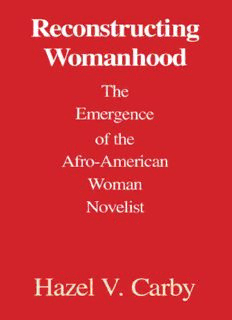
Reconstructing Womanhood: The Emergence of the Afro-American Woman Novelist PDF
Preview Reconstructing Womanhood: The Emergence of the Afro-American Woman Novelist
Reconstructing Womanhood The Emergence of the Afro-American Woman Novelist HAZEL V. CARBY OXFORD UNIVERSITY PRESS New York Oxford Oxford University Press Oxford New York Toronto Delhi Bombay Calcutta Madras Karachi Petaling Jaya Singapore Hong Kong Tokyo Nairobi Dar es Salaam Cape Town Melbourne Auckland and associated companies in Berlin Ibadan Copyright © 1987 First published in 1987 by Oxford University Press, Inc., 200 Madison Avenue, New York, New York 10016 First issued as an Oxford University Press paperback, 1989 Oxford is a registered trademark of Oxford University Press All rights reserved. No part of this publication may be reproduced, stored in a retrieval system, or transmitted, in any form or by any means, electronic, mechanical, photocopying, recording, or otherwise, without the prior permission of Oxford University Press, Inc. Library of Congress Cataloging-in-Publication Data Carby, Hazel V. Reconstructing womanhood. "Bibliography of texts by Black women authors" : p. Bibliography: p. 1. American fiction—Afro-American authors—History and criticism. 2. American fiction—Women authors—History and criticism. 3. American fiction—19th century—History and criticism. 4. Afro-American women in literature. 5. Women and literature—United States. 6. Feminism and literature—United States. I. Title. PS153.N5C37 1987 813'.4'099287 87-11055 ISBN 0-19-504164-X ISBN 0-19-506071-7 (pbk.) 98765 Printed in the United States of America For my parents This page intentionally left blank Acknowledgments No intellectual endeavor is ever the work of one individual; I have received a great deal of support, both financial and intellectual. I would like to thank the Social Science Research Council of Great Britain and the Afro-American Studies Program at Yale University, for providing me with money for research, and Wesleyan University for a sabbatical to complete the book. The library staff at Sterling Memorial Library and Beinecke Library at Yale, at Olin Library at Wesleyan, at the New York Public Library, at the Schomberg Cen- ter for Research in Black Culture, and at the Moorland-Spingarn Research Center provided me with invaluable assistance. For intel- lectual support and encouragement I am grateful to John Blassin- game, Nancy Cott, the late Charles T. Davis, and Michael Green. For their extensive critical comments and insights I owe particular thanks to Joanne Braxton, Henry Louis Gates, Jr., Valarie Hart- mann, Ketu Katrak, Richard Slotkin, Mary Helen Washington, Susan Willis, and Jean Yellin. To all my colleagues at Birmingham, Yale, and Wesleyan universities I owe thanks for their stimulating and supportive friendship. Paul Gilroy, Vron Ware, Errol Law- rence, Val Amos, and Pratibha Parma have long been sisters and brothers in the political struggle for black liberation. For his rigor- ous intellect, political acumen, and theoretical insights, and for being the best teacher I ever had, I am indebted to Stuart Hall. For his extensive editorial assistance, his constant emotional support and encouragement, and for being my best friend, I thank Michael Denning. A different version of Chapter Five appeared as "'On the Threshold of Woman's Era': Lynching, Empire and Sexuality in Black Feminist Theory," in Critical Inquiry 12 (Autumn 1985): 262-77, copyright © 1985 by the University of Chicago. This page intentionally left blank Contents 1 "Woman's Era" Rethinking Black Feminist Theory 3 2 Slave and Mistress Ideologies of Womanhood under Slavery 20 3 "Hear My Voice, Ye Careless Daughters" Narratives of Slave and Free Women before Emancipation 40 4 "Of Lasting Service for the Race" The Work of Frances Ellen Watkins Harper 62 5 "In the Quiet, Undisputed Dignity of My Womanhood" Black Feminist Thought after Emancipation 95 6 "Of What Use Is Fiction?" Pauline Elizabeth Hopkins 121 7 "All the Fire and Romance" The Magazine Fiction of Pauline Hopkins 145 8 The Quicksands of Representation Rethinking Black Cultural Politics 163 Notes 177 Bibliography of Texts by Black Women Authors 199 General Bibliography 205 Index 217 This page intentionally left blank Reconstructing Womanhood
Description: